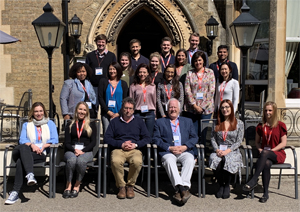Is the tide finally turning on gender imbalance in the maritime industry?
At the most recent bunker training course run by Petrospot in Oxford, England, two-thirds of the attendees were female. In many other business situations, this wouldn’t be anything to remark upon. Since half the world’s population is female, it should be expected that at least half the people at any event are women.
However, the balance of gender at the Petrospot course was quite remarkable for the shipping industry, because at most 4 percent of the industry’s sea-based workforce is female. The important question to ask, though, is does this attendance reflect the gender change that we’ve been waiting for?
It’s certainly timely. Kitack Lim, secretary-general of the International Maritime Organization (IMO), announced in August that the World Maritime Day theme for 2019 was “Empowering Women in the Maritime Community,” and he spoke on the subject at London International Shipping Week in September.
Industry leaders Kimberly Westmoreland, director of global fuel procurement at Royal Caribbean Cruises, and Lindsay Malen-Habib, client services manager at Resolve Marine Group, also recently explored the theme of empowering and encouraging women in the maritime industry.
Fort Lauderdale, Fla., is Westmoreland’s hometown, and ahead of Maritime Week Americas, which took place in the city in May, she confirmed that she is seeing a change in the industry.
“I think it is increasingly unusual to not see a woman sitting at the table with me in one capacity or another,” Westmoreland said. “Now, more than ever, women are breaking down stereotypes and truly making waves in male-dominated sectors. It’s encouraging to see a greater presence of females in the bunker industry. With seven females on my team, I’d like to think we are contributing to that wave.”
Westmoreland and Malen-Habib are at pains to point out that working in the maritime sector is all about teamwork, an attractive option to many people. Westmoreland also highlights the pleasure and benefits gained from traveling around the world, something millennials entering the workplace are especially keen on.
“I love traveling, and there is tremendous value in traveling to the ports where we bunker,” she said. “You can’t beat seeing the operation for yourself — where the ship will be fueled and how it all plays out. We bunker in 144 ports around the world and my team operates 57 vessels. We get to travel the world and experience firsthand how different countries operate.
“I like to visit our more strategic ports to see what our operations look like, understand where the risks lie, and to see how it all flows,” she said. “Seeing things firsthand gives you a much greater perspective. I’m able to have a different conversation than I would have on the phone or over email. You gain better perspective. The networking is better, quality information gets shared, and this helps our operations become more efficient.”
Speaking to Malen-Habib, it is clear she too is a trailblazer who can inspire more people to follow in her footsteps.
“Currently, we actually have more female directors than male directors at Resolve Marine, but the message I want to get out is that your gender or ethnicity doesn’t matter, whether you are a man or woman, or on what side of the industry you originate,” Malen-Habib said. “We are all equals in the bigger task of trying to (achieve) accomplishments that impact the world.”
Ports, for example, are central to the world’s infrastructure, and she considers natural-disaster salvage as the first line of defense in keeping them open.
“Harbor clearance and vessel and debris recovery are all essential life-saving services,” she said. “We have used Lana Rose, a former seismic and research vessel, to help residents and teams affected by Hurricanes Irma, Katrina and Maria. We have also worked on earthquakes in Haiti, and the list goes on.”
Malen-Habib acknowledged that maritime is a male-dominated industry, but she always brings the focus back to the people, the team and the work they do, which is what will attract a new generation of workers — hopefully, half of them women.
“The most pleasure I get from my job is talking about the work we do and the people we employ,” she said. “You can engage a salvage tug under contract, but if you don’t have the appropriate salvage masters, naval architects, technical engineers, marine firefighters, salvage divers, etc., in your employment who are loyal to your team, you have nothing. So, we are all about the people.
“The bottom line is that we consider ourselves protectors and stewards of the environment in terms of our work in emergency response, salvage, compliance and wreck removal,” she added.
This powerful determination and conviction are just what our industry needs to deliver a tangible outcome to the IMO’s World Maritime Day theme. Training and environmental protection, which matter so much to young people, are central to the work of Resolve Marine Group and Royal Caribbean Cruises. The more people like Westmoreland and Malen-Habib who explain their work in the maritime sector, and the vital role of ports and their auxiliary services to our way of life, the more chance we have of celebrating a permanent change to the gender imbalance of our seagoing workforce.
Llewellyn Bankes-Hughes is managing director of Petrospot. He has been in bunkering, oil and shipping since 1980 as a journalist and broker, establishing Petrospot in 2003 to publish Bunkerspot magazine, news and pricing services, and bunker and shipping books. He has created and operated events in 25 countries around the world, including Maritime Week Americas and London International Shipping Week, and training programs including the Oxford Bunker Course.

